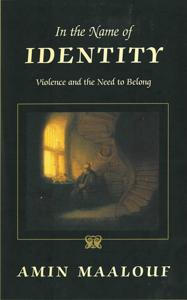
Want to learn the ideas in In the Name of Identity better than ever? Read the world’s #1 book summary of In the Name of Identity by Amin Maalouf here.
Read a brief 1-Page Summary or watch video summaries curated by our expert team. Note: this book guide is not affiliated with or endorsed by the publisher or author, and we always encourage you to purchase and read the full book.
Video Summaries of In the Name of Identity
We’ve scoured the Internet for the very best videos on In the Name of Identity, from high-quality videos summaries to interviews or commentary by Amin Maalouf.
1-Page Summary of In the Name of Identity
Overview
If you were asked “who are you?” how would you answer? If the question was posed to a group of people, what commonalities do they share and what differences do they have?
This passage will help you understand identity. It will take you on a tour of the world and show how aspects of your life influence the way you view yourself, sometimes incorrectly. You’ll learn why no religion is inherently cruel; how we’re all unique; and how radicalism arises.
Big Idea #1: “Identity” is a deceptive and loaded word that requires close examination.
Identifying your identity is a tricky thing because it’s formed by a number of factors, such as gender, nationality, sexual orientation and other things. It can be hard to define who you are without taking all these things into consideration. However, that doesn’t mean your identity is fixed forever. Your identity may change over time as you identify with different aspects of yourself more than others. For example, someone from a lower socioeconomic class might feel proud about their working class roots when they’re around people who inherited their wealth at an exclusive party.
While many people’s identities change over time, others have a more fixed idea of who they are. Some might identify strongly with one affiliation (like their religion or country) and consider the rest secondary.
However, if we categorize ourselves based on our personal attributes and values, we might create a hierarchy that places us above or below others. This can lead to problems because other people may not fit the same categories as us.
The author is an Arabic-speaking Lebanese novelist who moved to France at the age of 27. He has lived there for 22 years, and although he converted to Christianity in his early 30s, he remains a Muslim by heritage.
People often ask me about my background, and I find their questions misguided. A person doesn’t have two different identities. Instead, a person is the sum of all his characteristics, so it’s hard to say that he feels like one thing over another.
Big Idea #2: Our identity is affected by how others see us.
Did you know that identity is something we learn? It’s not innate. We construct our identities by the way we look at others and how they see us.
We all have the ability to influence others’ identities by categorizing them into groups. For example, we can say that Austrians are different from Germans and treat every Austrian as an individual who is also unique. However, we sometimes lump people together and assume that they’re identical in their behaviors or opinions. We may generalize about certain groups of people without realizing how much harm it causes those individuals’ sense of identity.
For example, when we group people together in a negative way, they will try to defend their identities. This is especially true if outsiders attack the group’s identity. For instance, an Italian man who was gay during Fascist Italy might have been proud of his country and even a nationalist until the Fascists came along and persecuted him for being gay. In order to protect himself from persecution by others, he had to identify with his sexual preference rather than his nationality.
When people feel their faith is threatened, they begin to identify with the religion. However, if other aspects of one’s identity are also threatened, then a person might fight against members of his or her own group.
Big Idea #3: No one religion, affiliation or culture is inherently more violent than any other.
When we describe people in a simplistic way, it creates stereotypes that affect us all.





